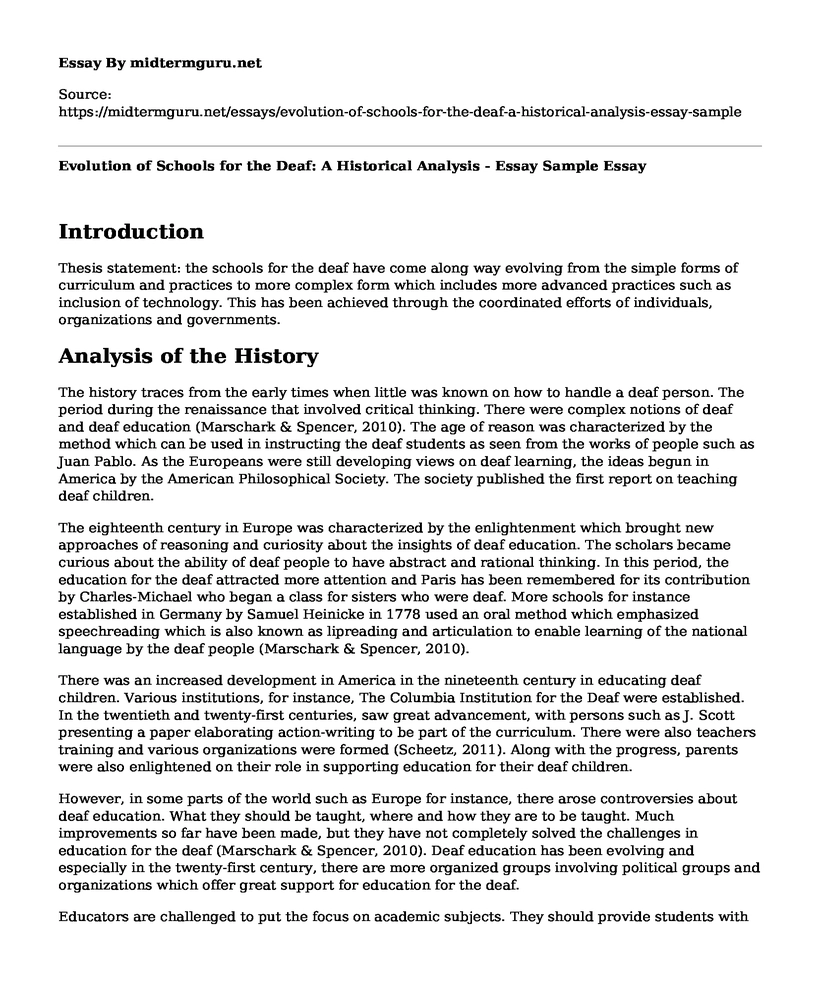Introduction
Thesis statement: the schools for the deaf have come along way evolving from the simple forms of curriculum and practices to more complex form which includes more advanced practices such as inclusion of technology. This has been achieved through the coordinated efforts of individuals, organizations and governments.
Analysis of the History
The history traces from the early times when little was known on how to handle a deaf person. The period during the renaissance that involved critical thinking. There were complex notions of deaf and deaf education (Marschark & Spencer, 2010). The age of reason was characterized by the method which can be used in instructing the deaf students as seen from the works of people such as Juan Pablo. As the Europeans were still developing views on deaf learning, the ideas begun in America by the American Philosophical Society. The society published the first report on teaching deaf children.
The eighteenth century in Europe was characterized by the enlightenment which brought new approaches of reasoning and curiosity about the insights of deaf education. The scholars became curious about the ability of deaf people to have abstract and rational thinking. In this period, the education for the deaf attracted more attention and Paris has been remembered for its contribution by Charles-Michael who began a class for sisters who were deaf. More schools for instance established in Germany by Samuel Heinicke in 1778 used an oral method which emphasized speechreading which is also known as lipreading and articulation to enable learning of the national language by the deaf people (Marschark & Spencer, 2010).
There was an increased development in America in the nineteenth century in educating deaf children. Various institutions, for instance, The Columbia Institution for the Deaf were established. In the twentieth and twenty-first centuries, saw great advancement, with persons such as J. Scott presenting a paper elaborating action-writing to be part of the curriculum. There were also teachers training and various organizations were formed (Scheetz, 2011). Along with the progress, parents were also enlightened on their role in supporting education for their deaf children.
However, in some parts of the world such as Europe for instance, there arose controversies about deaf education. What they should be taught, where and how they are to be taught. Much improvements so far have been made, but they have not completely solved the challenges in education for the deaf (Marschark & Spencer, 2010). Deaf education has been evolving and especially in the twenty-first century, there are more organized groups involving political groups and organizations which offer great support for education for the deaf.
Educators are challenged to put the focus on academic subjects. They should provide students with the skills needed for success. From 1960, reforms on education have been made in the United States. These reforms have created awareness and especially on the curriculum and mastery of the subject by the teacher (Scheetz, 2011). There have been mandates which have impacted on the ways in which the deaf learners are handled. Among the reforms that have continued being made is the legislation concern education for the deaf. The programs and curriculum have also continued to be revised in order to fit the needs of the deaf learner.
Conclusion
Education for the deaf has evolved from an early period of lack of know-how on ways to handle deaf learners to developments that have provided efficient methods for assisting a deaf learner.
References
Marschark, M., & Spencer, P. E. (2010). The Oxford handbook of deaf studies, language, and education (Vol. 2). Oxford University Press.
Scheetz, N. A. (2011). Deaf education in the 21st century: Topics and trends. Pearson Higher Ed.Deaf education in the 21st century: Topics and trends. Pearson Higher Ed.
Cite this page
Evolution of Schools for the Deaf: A Historical Analysis - Essay Sample. (2023, Jan 19). Retrieved from https://midtermguru.com/essays/evolution-of-schools-for-the-deaf-a-historical-analysis-essay-sample
If you are the original author of this essay and no longer wish to have it published on the midtermguru.com website, please click below to request its removal:
- Essay Example on the Toddlers Bed-Sharing Controversy
- Essay on Introducing the Logic Model
- The Role of Mohandas Gandhi in Indian Politics - Essay Example
- A Day to Remember - Essay Sample
- How to Navigate the Relationship - Essay Sample
- Slave Trade and the Functioning of Enlightenment - Essay Sample
- Human Trafficking: Sex Trafficking - Essay Sample







